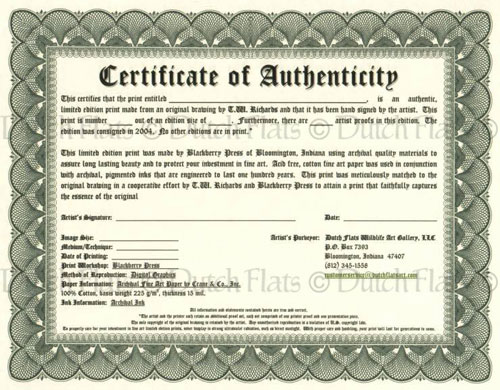| Certificate
of Authenticity
1.
What is a Certificate of Authenticity (COA)?
2.
What information is included on Dutch Flats' Certificate of
Authenticity?
3.
Is your Certificate of Authenticity worth the paper it's printed
on?
•
Example Certificate of Authenticity
The Certificate of Authenticity (COA)
is a document containing important information about each
print. The COA gives authentic fine-art, limited-edition printmakers
the opportunity to distinguish their work from mass produced
posters or reproductions printed and reprinted in unlimited
quantities, which some dealers try to pass off as "limited
edition" prints.
The extensive information provided
by the printmakers on the COA not only guarantees the authenticity
of their work, but also educates the buyer as to the specifics
of his or her investment. A proper Certificate of Authenticity
adds value to a fine-art limited edition print and it is an
important part of your purchase because it explains in detail
all of the various factors of a print's production and edition.
It should be kept with your limited edition print and transferred
to any subsequent investor if you ever decide to sell your
artwork.
[Back to top]
Dutch Flats Wildlife Art Gallery, LLC
believes that the detailed documentation, which accompanies
each limited edition print, is an essential element of your
purchase. Our documentation policy regarding the techniques
and editions of each limited edition print is simple: "the
truth, the whole truth and nothing but the truth." This
is why we include the following information on the COA:
•Title
of Print
•Artist's Name
•Size of Edition
•Number of Artist's Proofs
•Artist's Signature
•Image Size
•Medium/Technique |
•Date
of Printing
•Name of Print Workshop
•Method
of Reproduction
•Paper Information
•Ink
Information |
Each Certificate contains all of the
essential information to verify the authenticity and chronology
of the print.
[Back to top]
There is tremendous abuse in the "certificate
of authenticity" or COA business, especially at online
auctions. Unless a Certificate of Authenticity originates
from and is signed either by the artist, the publisher of
the art (in the case of limited editions), a confirmed dealer
or agent of the artist (not a third party or reseller), or
an acknowledged expert on the artist, it is pretty much meaningless.
A legitimate COA must contain specific
details about the art such as when and how it was produced,
the names of people or companies involved in its production
as well as the exact title of the artwork and its dimensions.
It should also state the qualifications of the individual
or entity that authored the certificate and include his or
her current contact information.
[Back to top]

[Back to top]
|
